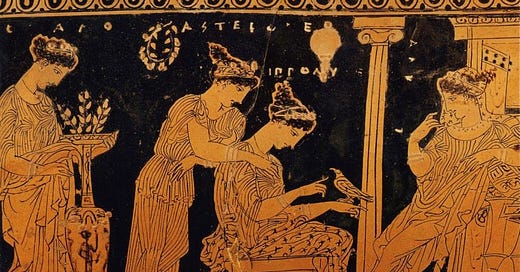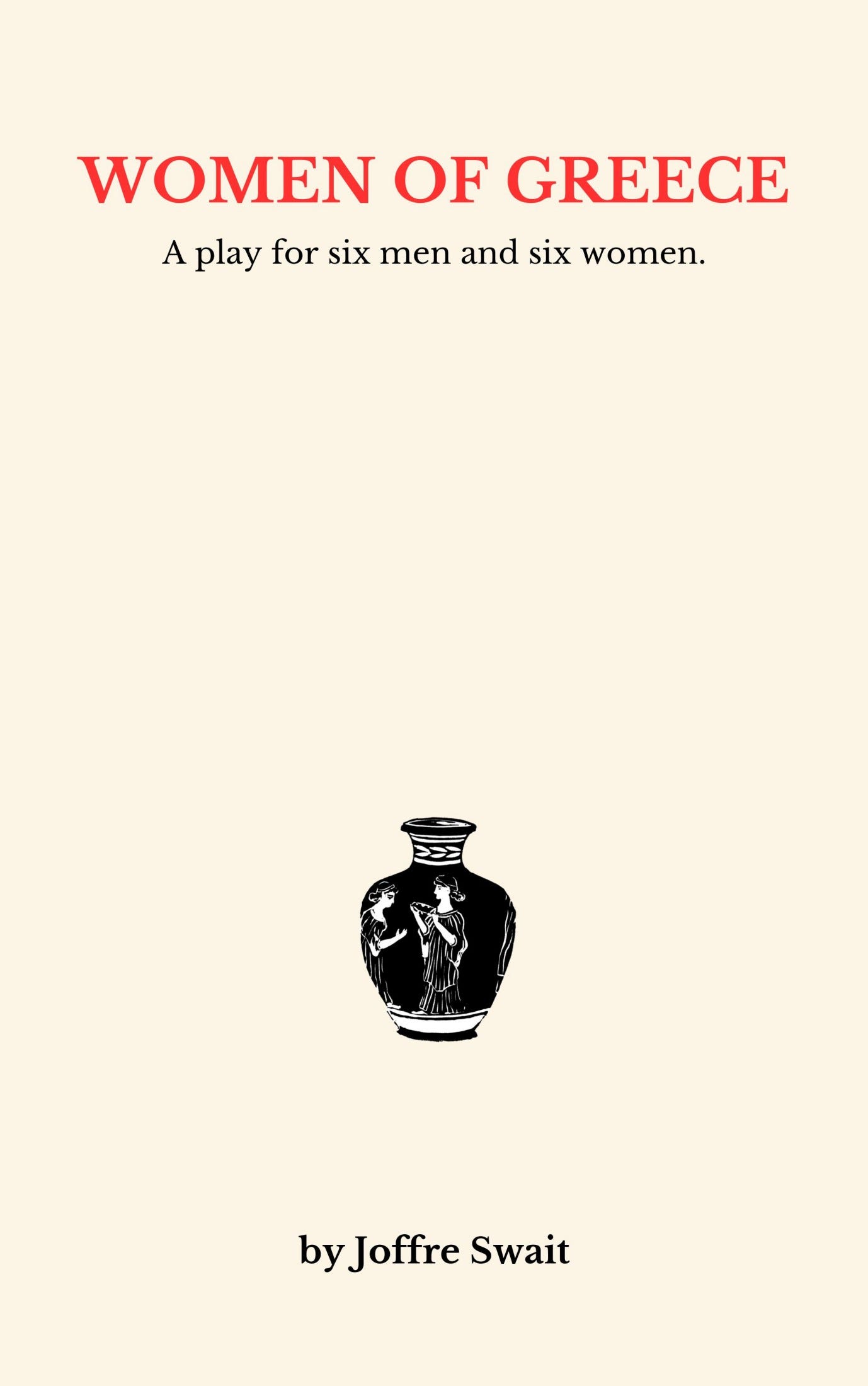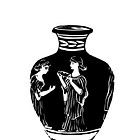Women of Greece (Part 2): Book Release Party
A play about glory, masculinity, and femininity. Can κλέος truly be ἄφθιτον?
Here is the second part (of three) of Women of Greece, my verse play. It is a satire of Greek theater, their mythology and concepts of glory, masculinity, and femininity. I hope it is a good satire, which would mean that it would not only poke holes, but perhaps show some love, and suggest something better. In the case of Women of Greece, it is more than a suggestion: it is a direct contrast between Greek paganism and Gospel cosmology/ontology.
Plus, it’s funny!
Like the Star Wars trilogy (the only one that’s real), the second installment is the most depressing…the light arrives in part 3. Part 1 can be found below.
I hope you enjoy. If you’d like to own the entire thing as e-book/pdf, click the button below to purchase.
Women of Greece
Act 2.
VI. The Prostitute Enter a ghostly figure dressed as a decadent oriental ruler. The ghost of the king of Jericho: You know who had the mind of a slut? Rahab. Now there was one faithless, easily hired. We faithfully visited every day. She conspired With Hebrew spies. Was Jericho really that bad? We had a deal! She had her house in the wall, Away from the eyes of our wives, but nothing shameful. We gave her gifts, her employment (her use!) was gainful, Her clan was honored, if I correctly recall. Mind you, she was no temple prostitute. Just a loose woman, but a portal to Ashtoreth Nonetheless. A giver of the little death. She knew the score. I should have been more astute. You know who had a woman’s mind? Rahab! Fearful and faithless, secretive she’d always been. They say the Hebrews treat her like a queen. And what did I get? Look! I got stabbed! The ghost flounces off stage. Lights darken. VII. The Furies The Bard and The Mocker resume their places. The Chorus of Furies emerges, masked and dressed in black. The ghost of Clytemnestra is optional. The Bard speaks: When Agamemnon returned with plundered gold, His wife and her lover received him with bloody blade. Now the men of Argos are afraid; A web of crimson slaughters the bodies enfolds. The Mocker speaks, gesturing at the Chorus: These are so frightening we dare only call them Good. The Goodly Ones, the Kind Ones, woe betide the slayer (Especially kin killer) when raging from their lair Emerge the Furies, hag avengers of blood. The Bard speaks: The ghost of Clytemnestra begs they wake. They mutter and kick in their sleep like dogs who dream, While she who devised a husband-murdering scheme Screams and screams that they wake and soothe her ache. Being a ghost, all she can do now Is follow stage directions: ghost sinks. The Furies wake: The Chorus of Furies speak to each other, alternating individually. They speak the last line of each complete verse in chorus. Chorus of Furies: Sisters! a thousand winks Have passed, it seems we’ve missed a royal row. Orestes slew his mother and now must die. Clytemnestra’s blood screams from the ground, Reminding us that we’re by oaths bound To silence what murder calls out: the plaintive cry. And why did Orestes kill his ax-wielding mother? She’d killed her husband, Agamemnon King, Sire of Orestes and two girl siblings. Electra was one, who plotted with her brother. Speaking of two girl children borne, Did you hear that Agamemnon returned With Cassandra the Seer in tow as booty he’d earned, And already she’d twin girls delivered, forlorn. Clytemnestra had her killed as well! Of course, what an insult to parade all that booty! To let her talk to the city’s men, distracting from duty! But we let those murders slide, asleep in hell. And why did Clytemnestra in a rage confront, Hack and slash and roll in a rug her master? Because he, to avoid climatological disaster, Had offered Iphegenia to Artemis of the Hunt. Iphigenia, that was the other’s name. You’ve likely forgotten her, not even a woman yet, A beautiful princess who cried and begged he relent. He wept his tears but gave the goddess her game. And why did Agamemnon eviscerate His beautiful girl child and offer her liver? For fear his fleet would not to Ilion be delivered, That he’d miss out on vengeance by arriving too late. Menelaos, unspeakably strong and bold! But Aphrodite opened your wife’s thighs To Paris, Trojan princeling, careless of lies. To think! Agamemnon’s brother a cuckold! Sisters! Furies! Goodly Ones, hear! That’s a lot of murders, a lot of blood Crying out from the soil in ghastly flood. We should be choosy about the ledgers we clear. We are revengers of womanhood thwarted, The bleeders and breeders sent to man as dire Curse from Zeus himself, for the theft of fire. We are that Hope left in the jar, aborted. VIII. The Kindly Ones Apollo and Athena take the stage, gesturing in silence to accompany the words of The Bard and The Mocker. Athena is a man in drag. The Bard speaks: Death notes and dark songs Apollo hates. The advocate he plays, as a god of verbs, Attacking the Furies, whose hypocrisy disturbs The very warp of the kosmos he highly rates. Apollo is twice the god of verbs, Of poetry and music; beauty, archers, contagion. He needs cities, people and persuasion. Alas for women, witches and users of herbs! Athena passes judgment: the Furies are fickle. They show preference; she’ll show none. The Ghastly Ones are given their night in the sun, For Athens they’re suddenly tame, dropping daggers for sickles. The Furies remove their masks and grovel before the gods, particularly Athena. The Mocker speaks: They are Earth Goddesses still, frightening But Venerable now, subject to Sky Gods. Badgered, bribed, berated, bawds turned frauds, Enraged until Athena mentions Zeus’ lightning. The same crack that was heard at Zeus’ entrance is heard. All except for The Bard and The Mocker exit, startled. The lights brighten as the curtain closes. IX. The Death of Orpheus The most beautiful man in the world emerges and takes center stage. He holds a lyre. The Mocker speaks: Orpheus charmed his way ‘cross Styx’s stream, Recall any possessed of a romantic bone In their bodies, any who pine alone. Each is the princess the most beautiful man redeems. The Maenads want only to play pan pipes. These are Mad Women, Unminded, Demented, the fruit of their reason unrinded. They drink the phrénezy of grapes overripe. The old Furies, now maskless, emerge as a Chorus of Maenads and stand behind Orpheus. Orpheus acts out the words, but remains silent. The Chorus is loud but still. The Bard speaks: Orpheus returns to Thrace upon the death Of Eurydice, almost-rescued wife. In Death’s domain he’d bargained for her life but reneged, looking back into the depths. The poets still wonder why he lacked the spine To play the man and choose to die, but balked. Rather than choose her company, he mocked The gods, trying to be both man and divine. The Mocker speaks: But Dionysus, now, there was a god Who loved his human mother, embraced his twin Nature, ascended and descended with a grin. Generations have trod, have trod, have trod. The god and the man, most gorgeous of each kind. Oversexed, the Mad Women whose cult Is wine and frenzy, who in orgy exult, Cannot have their god, so a man they’ll find. But the thing about Orpheus that Euridyce obscures Is that the company the lyrist craves Is that of men, youths who are soon to shave. They share one love: the gay tunes that ever endure. The Bard speaks: Hearing him sing of Adonis and the like, The Frenzied Women beg for his attentions. Their maws are wet with slobber, his rejection’s Unbearable. This is the breaking of the dike. The wildest one cries, The Chorus of Maenads speaks: See! Despiser of Women! Pandora was the first, beautiful to admire, But curse of Zeus himself, for the theft of fire. They hate us, even needing us for children. The Bard speaks: The wildest one cries, The Chorus of Maenads speaks: See! Hater of our Sex! The Bard speaks: The rocks and sticks the Maenads throw at the bard Apologize, for they love his voice unmarred. But they strike! His face with blood is spattered and specked. Orpheus runs, pleading for his life. His mind returns to Hell and looks behind. He ponders the distance between the sexes twined To each other, locked in spousal strife. The Mocker speaks: The rumor’s been he’s switching gods above, Exchanging Apollo’s sun and order bright For Dionysus, a god who devours and excites. Here is your paragon of romantic love. He runs, he pleads, he ponders his passions. In loving Eurydice himself he adored. That mirror broken, he found better and more: He’s the Thracian who made boy love the fashion. The Bard speaks: The wildest one cries, The Maenads speak: See! Hater of our Sex! He despises us and cares nothing for sons, For his name lives on in the songs of his tongue. We’ll tear from his voice the seed, no poems to erect! The Bard speaks: Long spades, and harvesting rakes they find. These they seize, the frenzied women engage, And first the ox and chickens feel their rage. Innocents screaming flee their bloody tide. Then to the poet they turn with spite and spit. In vain he lifts beseeching hands, in vain He tries, as before, his never-failing strains. But his fate, now past prevention, is writ. His melodies had moved both rock and bird, Now no song can save him, hands held high in plea. Once-charmed lips quieted. His voice torn free Is silent, and his soul takes flight unheard. Ah gods! how pitiless these women, like beasts! Even as he screamed unheard they tore The shoulder from socket, from his belly the gore, With bare hands, like a baby goat for some feast. Chorus of Maenads exits. The birds lament him, perched upon each tree. Sing of those sacred lips, whose thrilling noise Filled tigers and senseless rocks and pretty boys With love. Now his head floats out to sea. The Mocker speaks, gesturing at the heavens: Dionysus watches, amused in his way, As the face of the only man as beautiful as he Floats the wave. His soul in Hades should be, But strangely, the head is singing. It heads for Mytilene’s bay. There is an oracle, chief on Lesbos’ isle. This island of love! Apollo in blessing unasked Brings the world’s first pederast To a place of rest, to prophesy a while. Hades can wait! Now let Sappho sing, Let the women of Greece, beautiful and meek, Find the love they desire and the souls they seek. Here under the god Apollo let praises ring! Orpheus exits as the curtain closes.





